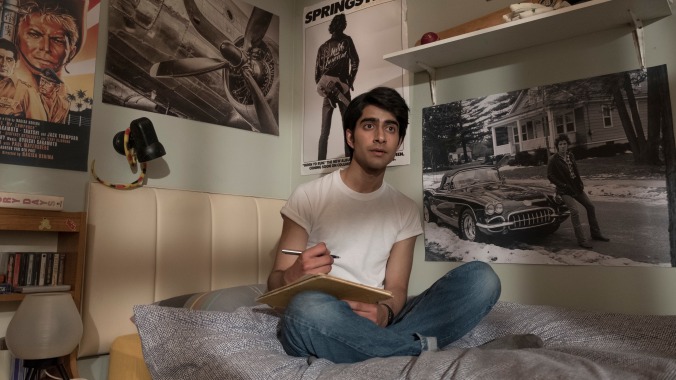You don’t need to love Springsteen to like the thoughtful crowd-pleaser Blinded By The Light


Blinded By The Light is the latest in what writer-director Gurinder Chadha calls her “genially subversive” filmography, made up of feel-good movies that also tackle difficult topics like racism, sexism, class, and cultural divides. Based on the real-life experience of journalist Sarfraz Manzoor (who also co-wrote the script), it’s a 1980s-set tale of a British-Pakistani Muslim teenager who unexpectedly finds himself in the music of Bruce Springsteen. A cheerful, cheesy coming-of-age story that evokes the earnest films of the era in which it’s set, Blinded By The Light is not one for the schmaltz-averse. Yet as with Chadha’s Bend It Like Beckham and Bride & Prejudice, there’s some appreciably meaty stuff beneath its toe-tapping, crowd-pleasing surface.
Manzoor’s adolescence is retold as the story of Javed (delightful newcomer Viveik Kalra), a shy teen whose family is struggling to get by in the small town of Luton during the crushing economic recession of the late Thatcher years. An aspiring writer, Javed is bold enough to enroll in English rather than economics for his A-levels, but not quite bold enough to tell his domineering, practicality-minded dad (Kulvinder Ghir) about his dreams. Instead, he scribbles down poems in secret notebooks and occasionally provides lyrics for his New Wave-loving bestie (Game Of Thrones’ Dean-Charles Chapman, well-used), who can’t understand why Javed thinks that political strife and economic woes are something people would want to hear someone sing about. Indeed, no one seems to understand Javed until a Sikh classmate named Roops (Aaron Phagura) hands him two Springsteen cassettes with the solemnity of a religious leader passing on a sacred text.
Blinded By The Light quickly becomes a story of first love—not of the romantic kind, although there’s a bit of that in Javed’s crush on a political-activist classmate (Nell Williams). Instead, it’s the story of the first time a piece of art reaches you on such a deep level that you can’t believe someone didn’t reach into your brain to create it. Chadha renders that youthful rite of passage in all its over-the-top glory as the lyrics of Springsteen’s “Dancing In The Dark” pop up around Javed’s head as he listens to the song for the first time, while the words of “The Promised Land” spill out into multi-storied projections on the walls of Javed’s neighborhood on the night of the Great Storm of 1987. “I didn’t know music could be like that,” he marvels as Springsteen’s plaintive lyrics somehow speak directly to every single emotion he’s ever felt.
It’s one of the many sequences where the film almost turns into a full-on musical, although one that’s more akin to John Carney’s scrappy Sing Street than Danny Boyle’s glossy Yesterday. In a Breakfast Club homage turned up to 11, Javed and Roops blast “Born To Run” at their school and the song somehow seems to follow them across a jubilant dance through Luton. Springsteen fans will eat this up with a spoon, of course, but a passion for or even a familiarity with Springsteen isn’t really a requirement. In fact, the film earns a lot of laughs from how supremely uncool it is to be a Springsteen-loving teen in 1987. It’s the sort of music your dad listens to, the school’s radio DJ scoffs while flipping through records of Pet Shops Boys and Tiffany. Chadha offers a primer on what made Springsteen’s music groundbreaking while also allowing The Boss to stand in for any beloved teenage musical passion; she fills Javed’s school with students who are equally obsessed with Wham! and Salt-N-Pepa. Meanwhile, his sister (Nikita Mehta) sneaks off to daytime bhangra raves where the music validates her identity in the same way Springsteen does his. It’s one of the many touches that elevate Blinded By The Light with nuance and empathy.
Chadha also punctuates Blinded By The Light’s unbridled joy with realistic depictions of racism, which are all the more upsetting because of how commonplace they clearly are for Luton’s Pakistani community. Javed watches with horror as local kids pee through the mail slot at the house of a family friend, who demurs that it’s not a problem because they put down a plastic mat to prepare for this kind of thing. Even more terrifying (and timely) is the depiction of Britain’s fascist National Front movement, which sweeps through Luton in an organized neo-Nazi march. Chadha walks a fine line between maintaining the film’s feel-good tone and acknowledging that systemic racism isn’t something that can simply be overcome with an earnestly delivered Springsteen lyric.
Elsewhere, however, Blinded By The Light occasionally over-eggs the pudding with maudlin sentiment. Using Javed’s poems as narration is a device that never quite works, and his conflict with his father—which is the ostensible heart of the film—only sporadically rises above familiarity into something more specific. Though Blinded By The Light ultimately settles on a welcome message about the importance of forging an identity that’s inspired but never fully dominated by the things you love, it takes just a little too long to get there. Still, anchored by an endlessly endearing lead performance from Kalra and the steady hand of a filmmaker operating at her ideal wavelength (this is Chadha’s strongest film since Bend It Like Beckham), Blinded By The Light is such a joyful ride that it’s hard to quibble with its flaws. As with the music of The Boss himself, its propulsive melody carries a meaningful message.